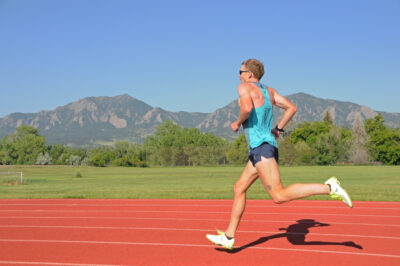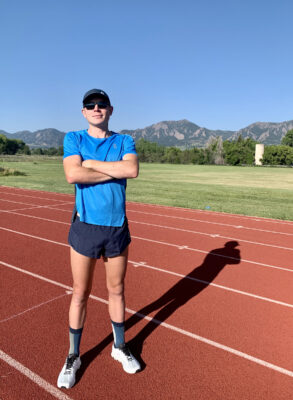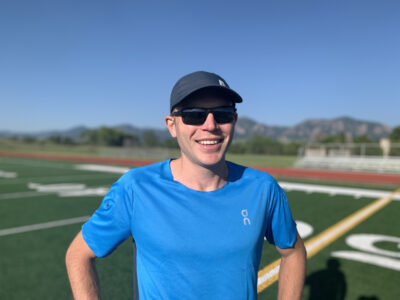Unsponsored No More: After Earning Olympic Spot, Marathoner Jake Riley Signs with On
By Jonathan Gault
July 3, 2020
The last time Jake Riley had a shoe contract, Hillary Clinton was the favorite to win the United States presidency. The Chicago Cubs were still working on a 108-year World Series drought. The word “Vaporfly” did not exist.
Yeah. It’s been a while.
When Riley left the Hansons-Brooks Original Distance Project in September 2016, few could have imagined the path he would take to the 2020 Olympic Games in Tokyo — especially because those Games will no longer be held in 2020 and the event in which he qualified, the marathon, will be held in the northern city of Sapporo rather than Tokyo.
Riley survived a divorce, Achilles surgery, and a coaching change to make the US team at the US Olympic Trials in February. He received the shoes he wore on that windy day in Atlanta — Nike’s futuristic Alphaflys — two days before the race, for free. Unlike the other five athletes who made the team, Riley did not have a shoe contract.
That has now changed. Riley, 32, has inked a deal with Swiss running brand On that takes him through the end of 2024. He represents the brand’s highest-profile US distance signing to date.
As with his path to the Olympics, Riley’s path to sponsorship was circuitous. After his breakout performance at the Chicago Marathon in October 2019 — Riley finished as the top American in ninth in 2:10:36 — he had the opportunity to pursue a sponsorship, but elected to remain unattached heading into the Trials. This afforded him the flexibility to race in Nike’s Vaporflys (or Alphaflys, as it turned out), the shoes he wore in Chicago and the ones that have led to record-breaking marathon times across the globe in recent years.
Riley’s bet paid off, as he ran another PR (2:10:02) to make the team in Atlanta. Two weeks after the Trials, he and his agent/coach Lee Troop were in talks with several companies. Then the coronavirus hit the United States.
“Everybody went dark,” Riley says. “People had their workers furloughed and all this other kind of stuff. So I was never really concerned that there wasn’t going to be some sort of offer, that there wasn’t going to be something, but we knew there was going to be an economic downturn.”
Eventually, the interest returned. Riley said a few things stood out about On. Some of the other brands Riley spoke to wanted him to switch training groups, but On allowed him to stay in Boulder with Troop, the man who resurrected his career. Riley also liked the fact that On is a running-focused brand.
“With some of these bigger companies that have their fingers in a lot of different pies, you kind of see them drift in and drift out of the running space…” Riley says. “It was really important to me to be part of a company that [says]: we do runners, and that’s what our focus is.”
There was one more factor, which Riley says is a bigger part of the calculus a marathoner must consider when signing a contract than ever before: the shoe itself.
“It’s weird the new environment that we’re all in where [the] type of racing flat probably wouldn’t even have entered into my calculation three or four years ago,” Riley says. “But that was one of the things I wanted to make sure of before I signed with anyone. And On is developing a flat and I’ve been able to try out some of their prototypes. They’re not quite there yet, but they’re certainly on the right path and I think when they come out with their next iteration, I feel confident that we’re going to be able to do something that is competitive with the Vaporfly.”
For On, which was founded in 2010, signing Riley is evidence of the brand’s continued push into elite running. In the last two years, On has signed deals with two US pro groups, the Mammoth Track Club and ZAP Endurance.
“On is really trying to make a push to become bigger in the US market,” Riley says.
While Riley can now officially call himself a professional runner, he’s not giving up any of his side gigs just yet. He will continue to pursue his master’s in mechanical engineering at the University of Colorado. And he will still serve as a SAT/ACT prep tutor, at least through the end of 2020 and quite possibly longer than that.
“I think it’s important to have structure and to have something else outside of running,” Riley says. “…It’s weird how having more time in the day almost makes it harder to stay on top of your stuff. I find I stay a little bit more organized, I’m a little bit more present when I have other demands on my schedule.”
***
Riley will make his On debut on Saturday in a virtual 5k against 2016 Olympian Jared Ward, a rivalry that dates back to their matchup at the 2006 Foot Locker Cross Country Championships (Riley prevailed that day, finishing 14th, 17 seconds ahead of Ward). Riley will race in a parking lot in Boulder while Ward will compete remotely in Provo, Utah; KT Tape will offer prize money, which will be donated to local charities supporting COVID-19 relief efforts. The goal is to provide some entertainment for running-starved fans in lieu of the traditional buffet of Fourth of July road races. The race will be streamed live on T.E.A.M. Boulder’s Instagram page at 10 a.m. ET.
“When Jared and I were talking about setting this up, we were both kind of making sure at the end of every statement to say like, Well I haven’t really done a lot of speed work, so you’re not super fit right now, right?” Riley says. “…It’s gonna be 4th of July, go out, get the wheels turning, and then go have some hot dogs.”
While Riley may participate in a few more similar events this summer — he wants to run an all-out mile soon — they are unlikely to be races of the traditional sort. While he wouldn’t completely rule out a fall marathon (Chicago and London are the two biggest that remain on the schedule), Riley doesn’t expect to be on a marathon start line in 2020.
“I have kind of come to terms that there’s not going to be any,” Riley says.
So what does a marathoner do when there’s no marathons? First, Riley took some time off following the Trials to heal a knee injury. He’s spent a lot of time with his girlfriend, playing Yahtzee and going camping in Colorado. Since returning to training two months ago, he and Troop have dedicated time to improving aspects of his running that went overlooked while he was locked in for back-to-back marathon buildups last fall and winter.
For Riley, that means working on his speed. He’s been finishing up sessions with 200’s, 300’s, and 400’s, and though the times won’t turn any heads — he’s managed a 28 for 200 and a 44 for 300 — Riley believes the effort will be worth it.
“The layers of rust that are on those gears are thick, so busting them off has been a little embarrassing,” Riley says. “I feel very slow and very old. But I think once we get that out of the way, I can get back to something resembling fast.”
That extra speed could come in handy if Riley is to accomplish his next major goal: making the 2021 US World Cross Country team. A strong XC runner at Stanford (he was 6th at NCAAs as a junior in 2010 and 18th as a senior), Riley hopes to be among the seven runners representing the US in Bathurst, Australia, in March.
“Obviously it’s Lee’s stomping grounds,” Riley says, referring to his coach, a three-time Olympian for Australia. “Being able to go there and train where he’s trained before, that’s just another motivating factor.”
But that event, if it happens, is a long time into the future, in a world that likely won’t resemble the one we currently occupy. As much as Riley would like to think about a return to racing, he knows it’s not close to the most important thing going on in the country right now.
“The other difficult thing about this time is thinking about racing and these fun sort of things when there are so many bigger issues,” Riley says. “And I know it’s important to give people a break and I think running can be inspiring, but not losing sight of the fact that there’s some pretty momentous, history-altering events happening right now.”


